Words Are Dropping Out of the Language like . . .
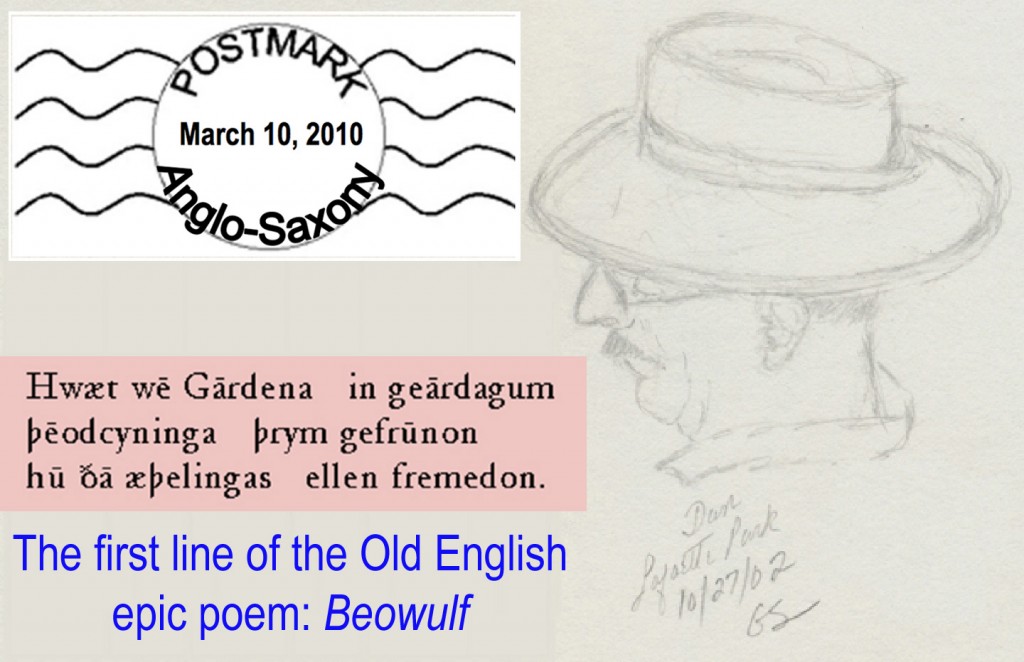 It doesn’t take a literary scholar to notice that the English language has changed a lot over its lifetime. The ‘Old English’ of the 11th century is quite unrecognizable to us moderns. It’s hard to believe it’s ‘English.’ (Click to listen to the first line of the Old English epic poem Beowulf).
It doesn’t take a literary scholar to notice that the English language has changed a lot over its lifetime. The ‘Old English’ of the 11th century is quite unrecognizable to us moderns. It’s hard to believe it’s ‘English.’ (Click to listen to the first line of the Old English epic poem Beowulf).
By the time the language evolved to ‘Middle English’ through the 12th-15th centuries, it started to look and sound a bit more familiar to us; but it still had a decidedly foreign sound to our modern ears. (Click for a little Chaucer.) Eventually, the so-called ‘Chancery Standard’ of the 1470s led the way to the Elizabethan English we recognize in Shakespeare. (Romeo & Juliet at the balcony)
We tend to think of the 400 years from Shakespeare to John Lennon as a long stable period of standardization. However, as I near the end of my sixth decade speaking this language, I am noticing that many words and phrases that I grew up with have been dropping out of the language. Some have been replaced with new ones created with the help of the scientific and cultural innovation that has exploded during my lifetime. Others have just dropped off the wagon to be crushed under the wheels of 21st-century multimedia (ouch!). These changes in our language certainly demonstrate the forces that have shaped our language through its long and varied history. A few examples of verbal the casualties from my youth serve to illustrate —
Since our fascination with automobiles dominated popular American culture in the 1950s, the language reflected that reality. How many of you remember ‘fender skirts?’ These popular add-ons were a luxury item for several automobile models.
All of my dad’s cars had ‘curb feelers’ in the 1950s and 60s, and the sound they made scraping against the curb was the sound we all associated with the arrival of a car in front of our house. A familiar status symbol I associated with ‘cool’ was the ‘steering knob.’ Some called them ‘Necker’s knobs’ because they allowed a young man to steer with one hand while ‘necking’ (when’s the last time you heard that word) with the girl beside him. Fortunately, ‘steering knobs’ went out of favor for reasons illustrated by their more pejorative name: ‘suicide knobs.’ So, these words left the language as automobile fashion and technology left these devices behind.
When are we going to stop referring to ’emergency brakes’ — perhaps when more of us realize that they were of little use in a real emergency and, as ‘parking brakes,’ their value is actually to prevent emergencies. ‘Continental Kits’ were a symbol of faux luxury hanging off the back of a car that was otherwise not a Lincoln Continental.
How many of you remember that headlight high-beams were activated with ‘dimmer switches’ located on the floor to the left of the clutch? (And how many of us are beginning to forget what a clutch does?) Did you have a car with a ‘spoiler’ in the 60s? How about glass packs? Again, these words are either gone or on their way out.
Our language has off-loaded a number of other words beyond the language of automobiles. When was ‘supper’ replaced by ‘dinner’ — perhaps it was about the time the verb ‘to sup’ was replaced with the verb ‘to dine?’ Do you remember when a ‘store-bought’ dress or ‘store-bought’ cookies were considered luxuries back when so many items of food and clothing were manufactured by moms? Today, nobody calls attention to the fact that anything is ‘store-bought.’ And I still remember how proud my parents were when they covered up their hardwood floors with new ‘wall-to-wall carpets,’ which were a status symbol in the 1950s. I find that especially fascinating as Gretta and I prepare to have our own carpets removed next week and replaced with hardwood floors. As we discuss that plan, I haven’t heard anyone use the term ‘wall-to-wall.’
I had a ‘percolator’ in my dormitory room in 1968. When was that last time you heard that word? 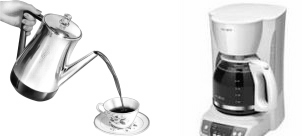 By the time I graduated in 1972, I had all but heard the last of it. (More trivia: does anyone remember the name of the spokesman who starred in the Mr. Coffee commercials that ended the reign of percolators and introduced the term ‘coffee maker’ to the language?) Similarly, my Dad had a ‘Hi-Fi’ that played all of his records when I was a kid. By the time I needed one of my own, the word ‘stereo’ had taken over. While the word ‘turntable’ seems to be surviving (at least as long as vinyl records remain collectibles), but how many people in our more recent generations remember the technological origin of the word ‘groovy’ — even if they still hear their elders use that silly word? Do you still use the word ‘album’ to refer to a recording with more than two songs on it? Or do you use the word ‘LP?’ My Dad used to call them ’33s’ and ’78s.’ (I still have some of my old ’45s.’) There is extra credit for anyone who can tell us what an EP was. I bought one produced by the Beatles in 1964.
By the time I graduated in 1972, I had all but heard the last of it. (More trivia: does anyone remember the name of the spokesman who starred in the Mr. Coffee commercials that ended the reign of percolators and introduced the term ‘coffee maker’ to the language?) Similarly, my Dad had a ‘Hi-Fi’ that played all of his records when I was a kid. By the time I needed one of my own, the word ‘stereo’ had taken over. While the word ‘turntable’ seems to be surviving (at least as long as vinyl records remain collectibles), but how many people in our more recent generations remember the technological origin of the word ‘groovy’ — even if they still hear their elders use that silly word? Do you still use the word ‘album’ to refer to a recording with more than two songs on it? Or do you use the word ‘LP?’ My Dad used to call them ’33s’ and ’78s.’ (I still have some of my old ’45s.’) There is extra credit for anyone who can tell us what an EP was. I bought one produced by the Beatles in 1964.
Did anyone notice when we stopped using the word ‘brassiere’ and the word ‘bra’ became the norm? Not long before that, I remember hearing my parents refer to underwear as ‘unmentionables’ in mixed company. ‘Pregnant’ was considered too graphic or clinical — certainly for TV. Do you remember when the expression “in a family way’ was the proper euphemism? When was the last time you heard that expression?
Can you think of other words that have begun to drop out of our language? Are there sports terms that have disappeared from the lexicon? (‘Basket catch?’, ‘pine tar?’) Have we lost any movie vocabulary? (Do people still go to see ‘flicks?” Have you heard the word ‘Celluloid’ in the last decade or so?) Words associated with politics? Books? Television? (Do they still have ‘test patterns’ very late at night?)
Here’s a ‘lost-word’ trivia question: Can anyone explain the clever play on words — including a word we don’t use anymore — that John Lennon was using in the title of a book of nonsense stories and drawings he published in 1965 called A Spaniard in the Works? No fair looking it up [oh, go ahead, you won’t get it otherwise].
What other verbal casualties can you think of?
Ain’t Goin’ Down Easy
Of course, the rules of usage and grammar are the hardest to change. For some reason, people get offended when other people begin neglecting or bending the rules of grammar or usage. Can you think of some examples of trends that are meeting resistance as our language attempts to change? Send us a comment. Is your language changing? I, of course, am resisting it.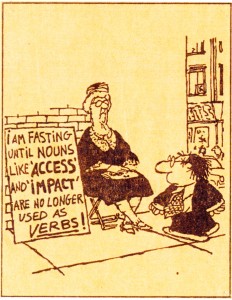
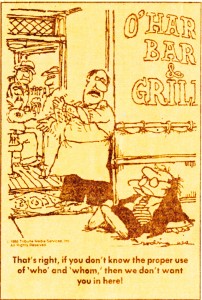
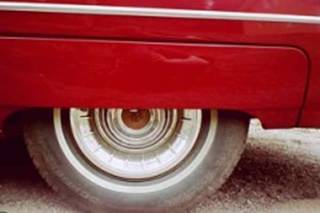
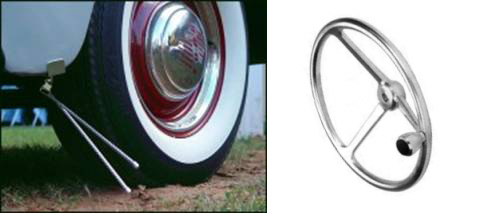
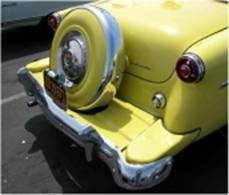
A fun post, Dan. In the interest of accuracy, let me note in imitation of Mark Twain that reports of some of these words’ deaths are grossly exaggerated. [AGREED — DRS.]
Cars still come with spoilers. My new Mazda 6 could have had one, and a search of Google for “Mazda 6 spoiler” in quotes still comes up with about 263,000 hits. Speaking of which, isn’t it incredible that we can just ask that kind of question and get an instant answer? — I’ll never get over how neat that is, but there’s something that is dying out — the people for whom that isn’t just a matter of course like driving an automobile or making a phone call is for us!
(Different kind of) “spoiler” alert — if you want to work on Dan’s word challenges, ignore the following, I’m about to answer them (unassisted by Google).
And just last night an hour before I read this post, I heard a singer/pianist on American Idol say he was finishing off his new EP without having to explain what that was. It translate to “I don’t have enough songs ready to fill a whole album!” or perhaps, “You wouldn’t pay $16 for a whole album from me, but if I put 3 or 4 songs on something that is priced more like a single, perhaps one of them will sell well enough to get a contract for the whole shebang” (keeping another old word alive, I hope). [YEP, JOE GETS THE PRIZE FOR THIS ONE. — DRS]
And “emergency brake” has been in the news a lot this week because the latest Toyota acceleration incident required that the CHP driving alongside using a bullhorn to tell the driver to stand on the pedal and pull the emergency brake too. Now, when fighting against a run-away engine (a new thing), this only slowed him down to 50 from over 90, but our emergency brakes were never supposed to handle this kind of “emergency.”
It was Joe DiMaggio, our distant relative, who was the spokesperson for Mr Coffee and contributed to the stamping out of the word “percolator.”
“Flick” still survives in the DVD-rent-by-mail or through internet streaming “Netflix” and only sort of in the photo-sharing (but not video sharing AFAIK) site Flickr.com which is now owned by Yahoo! But “yahoo” as used by Mr. Olenchalk and Jonathan Swift might be dying out.
“Supper” has always been a strange word. This is what I think the older generations of Faletti/Fenolio’s who are almost gone now meant The big meal of the day was at lunch-ti… errr, noon-time and that was dinner. At the end of the day you only needed something to keep you going a few hours until you went to bed early enough to be up at 5 AM. That was “supper,” a smaller meal. Hence the difference in meanings between “sup” and “dine” too. This one I’m not too sure of, so I’ll have to look it up.
John Lennon’s Spaniard is a “spanner,” still the British word for the tool Americans call a “wrench.” Not dead, just “un-American.” [YEP, JOE GETS THIS ONE, TOO. (and I expected him to get it.) — DRS]
Thanks for the trip down “memory lane.”
The ellipses at the end of your title invite us to fill in the blank there – Dropping Out of the Language Like… Flies.
But I started to answer …..Like “So’s your old man” and “So long, Titanic”, but that line from The Music Man is, I believe, “Slipping into their language like…” — Thanks to Spanky and Our Gang having come up in the recent ‘Top 20 songs of all time’ discussion, I recently bought their complete Mercury recordings, all three main albums, the greatest hits, the live album which was mostly new songs, and the complete single versions in stereo and mono. So I’ve heard Spanky et al saying these quite a few times in the last month or so.
And last week I discovered that the complete Captain and Tennille is now available on CD, so I’m listening to those. And yesterday I discovered that the three solo albums “Peter,” “Paul And,” and “Mary” are now available exclusively from Barnes and Noble! Speaking of “album,” originally, an album was a binder (similar to a photo album) with a set of of 4 or 5 78 RPM records with only one song on each side. When LPs came out, we got the collection on a single piece of vinyl with two sides, and the expected hits (singles) were usually the first or last song on either side. Now we get them all on the only “side” and the cuts in the middle have no particular value. Sometimes, the last cut on the first side becomes meaningless, such as the 23-second song “Intermission” on The Carpenters’ “A Song for You” album, whose words were “We’ll be right, We’ll be right, We’ll be right back… after we go to the bathroom!”
Dan
The section on car terms brought back so many memories of my father’s old Hudsons. I can remember while growing up, washing the street fenders on our cars about once a month in the summer. The status of a Continential kit was so aluring to my father that he put one on the back of a Hudson and painted the car yellow. I wondered how you could have gotten a picture of that car and its Continential kit when I first saw the article’s picture of the yellow car with a Continential kit.
Donald, I just Googled “Donald’s dad’s yellow Hudson” and there it was, complete with its Con Kit!
Dan, your reminiscences made me think of several things that have disappeared from our lives: ice boxes (I remember Nana’s), curlers and bobby pins used for setting and curling our hair, running boards on cars, roller window shades, pump organs, wind-up clocks, crank-up hospital beds, hand cranked ice cream makers, wringer washers, rug beaters instead of vacuums, outdoor water pumps and sink top water pumps, milk bottles that were glass with a cream separator on top and cardboard bottle caps on top and most important: ViewMasters. Thanks for prodding my memory!
And then I thought: what did they make maps with before paper, pencil, chalk, chalkboard, pen and ink, And what did they cut hair and toenails with before scissors? And how did they shave? Or DID they! AND how did they live without toilet paper? Glad I wasn’t around in those days of no toilet paper!
Bunny
[Corn cobs?! — DRS]
Thanks Dan for a delightful walk down memory lane. I can think of quite a few words that mercifully have disappeared, like cinch belts, corsets and girdles, slide rules and ditto machines
Oh my goodness — I had forgotten about ditto machines; but I still have my high-school slide rule.
Dan, On the topic of poetry: Your quoted poems are complicated but I especially like the one you wrote yourself as it would seem to apply to all those who have ever been in love. One of the many poems I wrote in High School was a reference to love, too. I wrote it at the age of 15, after I heard that Whistler Swans mate for life and so the last line of my poem was,”Like the gentle Whistler swans we’ll be a happy pair.” I have lost the rest of it along with all the others I wrote. I have been blessed to have that one line come true for me since Joe and I have been happily married for nearly 60 years now.
Bunny